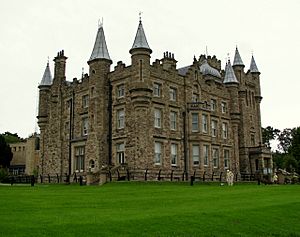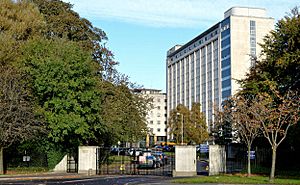Northern Ireland Executive facts for kids
Quick facts for kids Northern Ireland Executive |
|
|---|---|
 |
|
| Overview | |
| State | Northern Ireland |
| Leader | First Minister and deputy First Minister |
| Appointed by | Northern Ireland Assembly |
| Main organ | Executive Committee |
| Annual budget | GB£12.2 billion (2020–21) |
| Headquarters | Stormont Castle, Stormont Estate, Belfast |
The Northern Ireland Executive is the main part of the government in Northern Ireland. It is a special type of government where power is shared. This government works under the Northern Ireland Assembly, which is like its parliament. The Executive was created because of the Good Friday Agreement in 1998. This agreement helped bring peace and set up a way for different groups to work together in government.
The Executive includes the First Minister and deputy First Minister and other ministers. Each minister is in charge of a different area, like health or education. Most ministers are chosen by the main political parties in the Assembly. However, the Minister of Justice is chosen by a special vote that needs support from different communities. The Northern Ireland Executive is one of three such governments in the United Kingdom, alongside the Scottish and Welsh governments.
Sometimes, the government in Northern Ireland has stopped working. For example, in 2017, the deputy First Minister resigned, and the Executive could not continue. For a while, civil servants (people who work for the government but are not politicians) managed things. The Executive started working again in 2020 after a new agreement was made. It stopped working again in 2022 when the First Minister resigned. Since then, civil servants have been running Northern Ireland.
Contents
How the Government Works
Setting Up the Executive
The rules for the Northern Ireland Executive and the Assembly were set by the Northern Ireland Act 1998. This law followed the Good Friday Agreement. Later, the Northern Ireland (St Andrews Agreement) Act 2006 updated these rules.
Government Departments
In May 2016, the number of government departments was made smaller. Here are the main departments that exist now:
- The Executive Office
- Minister of Agriculture, Environment and Rural Affairs
- Minister for Communities
- Minister of Education
- Minister for the Economy
- Minister of Finance
- Minister of Health
- Minister for Infrastructure
- Minister of Justice
Some departments also changed their names:
- The Office of the First Minister and deputy First Minister became the Executive Office.
- The Department of Agriculture and Rural Development became the Department of Agriculture, Environment and Rural Affairs.
- The Department of Enterprise, Trade and Investment became the Department for the Economy.
- The Department of Finance and Personnel became the Department of Finance.
- The Department of Health, Social Services and Public Safety became the Department of Health.
- The Department for Regional Development became the Department for Infrastructure.
- The Department for Social Development became the Department for Communities.
Some departments were closed down, like the Department of Culture, Arts and Leisure.
Sharing Power in the Executive
Unlike other governments where one party might have all the power, the Northern Ireland Executive shares power. This means that important political parties in the Assembly get to have ministers in the government.
The number of ministers each party gets is decided by a system called the D'Hondt system. This system makes sure that major parties cannot be left out of the government. This way of governing is called a mandatory coalition. It means parties have to work together and share power.
The Executive needs the two largest parties to be part of it to work. This is because these parties choose the First Minister and deputy First Minister. Other parties can choose to join the Executive or be in opposition. Being in opposition means they watch and challenge the government from outside.
In 2010, a special rule was made for the Alliance Party of Northern Ireland. They were allowed to have the Minister of Justice role. This was important because it was when policing and justice powers were given to the Assembly.
How Meetings Work
The First Minister and deputy First Minister lead the Executive meetings together. These meetings are where ministers talk about and agree on important issues. They also decide which new laws and plans are most important.
Ministers must follow a special set of rules called the Ministerial Code. These rules say that ministers must:
- Work within the government's main plan.
- Support all decisions made by the Executive and the Assembly.
- Take part in important meetings with other governments.
Ministers have certain limits on their power. For example, they must follow human rights laws and cannot make decisions about things that are handled by the main United Kingdom Government.
If 30 members of the Assembly disagree with a minister's decision, they can ask for it to be reviewed. The Speaker of the Assembly decides if the issue is important enough for the Executive to discuss.
The number of ministers and their jobs can change. This needs to be agreed by the First Minister and deputy First Minister and approved by the Assembly.
Government Plans
The Good Friday Agreement says that the Executive must agree on a plan for government each year. This plan also includes the budget, which shows how money will be spent.
Here are some of the plans and budgets that have been published:
- Draft Programme for Government (2001–2002)
- Draft Programme for Government (2002–2003)
- Programme for Government 2008–2011
- Programme for Government 2011–2015
And some budgets:
- Budget 2008–11
- Budget 2011–15
The St Andrews Agreement also requires the Executive to create plans for certain important topics:
- Protecting and developing the Irish language.
- Protecting and developing Ulster Scots language, history, and culture.
- Helping people who are struggling with poverty and social exclusion.
History of the Executive
The First Executive (1974)
The very first Northern Ireland Executive was set up in 1974. It was formed after the Sunningdale Agreement. This government tried to bring together different political parties. However, it did not last long and ended after a few months.
The Current Executive (1998-Present)
The current Executive was created by the Belfast Agreement in 1998. The first First Minister and deputy First Minister were chosen in 1998. The full Executive started working in December 1999. It included parties like the Ulster Unionist Party, Social Democratic and Labour Party, Democratic Unionist Party, and Sinn Féin.
Sometimes, the government was paused. This happened when the departments were managed directly by the UK government. One long pause was from 2002 to 2007. This happened because the Ulster Unionist Party did not want to share power with Sinn Féin at that time.
Changes Over Time
- 2007-2011: The second Executive started in 2007. It was led by the DUP and Sinn Féin. Other parties also had ministers. There was a disagreement about giving policing and justice powers to the Assembly. These powers were finally given in 2010.
- 2011-2016: After the 2011 election, a third Executive was formed. The same five parties were part of it. For the first time, the Alliance Party gained control of a department through the D'Hondt system. In 2015, the UUP left the Executive.
- 2016-2017: The fourth Executive was formed after the May 2016 election. For the first time, some parties chose to be in opposition instead of joining the government. This Executive collapsed in January 2017. This happened when the deputy First Minister resigned.
Reformation in 2020
On January 11, 2020, the Executive was formed again. This happened after a new agreement called New Decade, New Approach. All five main parties joined the government. The First Minister was Arlene Foster (DUP), and the deputy First Minister was Michelle O'Neill (Sinn Féin). Other ministers were from the DUP, UUP, SDLP, and Sinn Féin. The Alliance Party leader, Naomi Long, became the Justice Minister. This Executive later collapsed, leading to the 2022 election.
Executive Committee
No Executive has been formed since the 2022 Northern Ireland Assembly election. The last Executive members were chosen on January 11, 2020.
Ministers get help from special assistants. The Attorney General for Northern Ireland is the main legal advisor to the Executive. This person is chosen by the First Minister and deputy First Minister.
See also
- Devolution in the United Kingdom
- Government spending in the United Kingdom
- Northern Ireland peace process
 | James Van Der Zee |
 | Alma Thomas |
 | Ellis Wilson |
 | Margaret Taylor-Burroughs |



